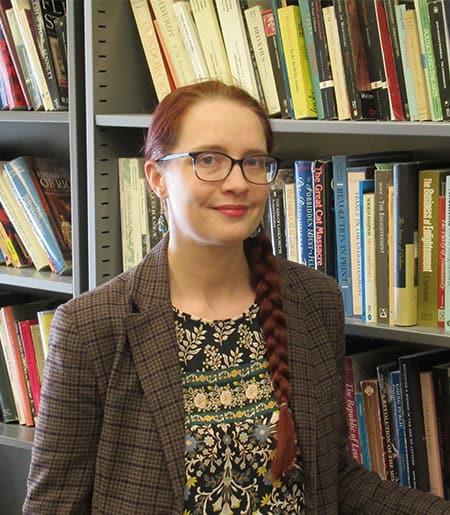 Her Passion for Universal Access to Education Led Her Straight to CPEP
Her Passion for Universal Access to Education Led Her Straight to CPEP
When she first arrived at Cornell as a doctoral student, Kelsey Utne immediately knew she wanted to teach a college class inside a prison, with CPEP. As soon as she had passed her A exams and became eligible, she taught her first class, Western Civilization 2, in the spring of 2018.
“I really feel strongly about everyone’s right to pursue higher degrees,” she explained. “Working with incarcerated students was an opportunity for me to put my money where my mouth was, by investing my own time.”
But she’d never stepped foot in a prison before. “I was worried about how to manage a classroom and discussion. I didn’t have a ton of teaching experience. What I did have was a lot of training as an historian. But I was so nervous.”
Now, having taught with CPEP for several semesters, she is over her nerves.
“What impresses me about CPEP students,” she says, “is how invested they are in their own learning and their willingness to probe and ask questions. Sometimes with [regular] Cornell students it’s like pulling teeth to get undegrads to discuss a reading. I almost never find that with CPEP students. I think it’s because they’ve so often been told they are dumb or not enough, so they’re not afraid of being called dumb. CPEP students are so much more willing to say, ‘I’ve lost the thread.’ A three-hour class [in prison] feels invigorating.”
This fall she is teaching her fifth CPEP class at Auburn Correctional Facility, History 3420: History of Modern South Asia from 1526 to 1947.
An advanced elective, the course offers a broad overview of the subcontinent from the start of the Mughal Empire to its partitioning into India and Pakistan—a stretch of 400 years in an area most CPEP students know very little about. Because of pandemic restrictions, the class is being conducted via correspondence until September, when Utne will be able to return to the prison classroom.
Utne, a Pittsburgh native, attended Salem State University in Massachusetts, where on a whim she signed up for an elective on modern South Asia. “I knew pretty much nothing. I remembered watching Gandhi in 9th grade. But this instructor was so great at getting me excited about a whole world. I joked that I minored in Michelle Louro,” she said with a laugh, naming the professor from whom she ended up taking no fewer than five classes.
Utne graduated from college at age 27, the first student in Salem’s history to win a Fulbright fellowship, which she used to study for a year in Delhi, India.
“That’s part of why I get so invested in access to education,” she explained. “My classmates and I were mostly non-traditional students ourselves.”
